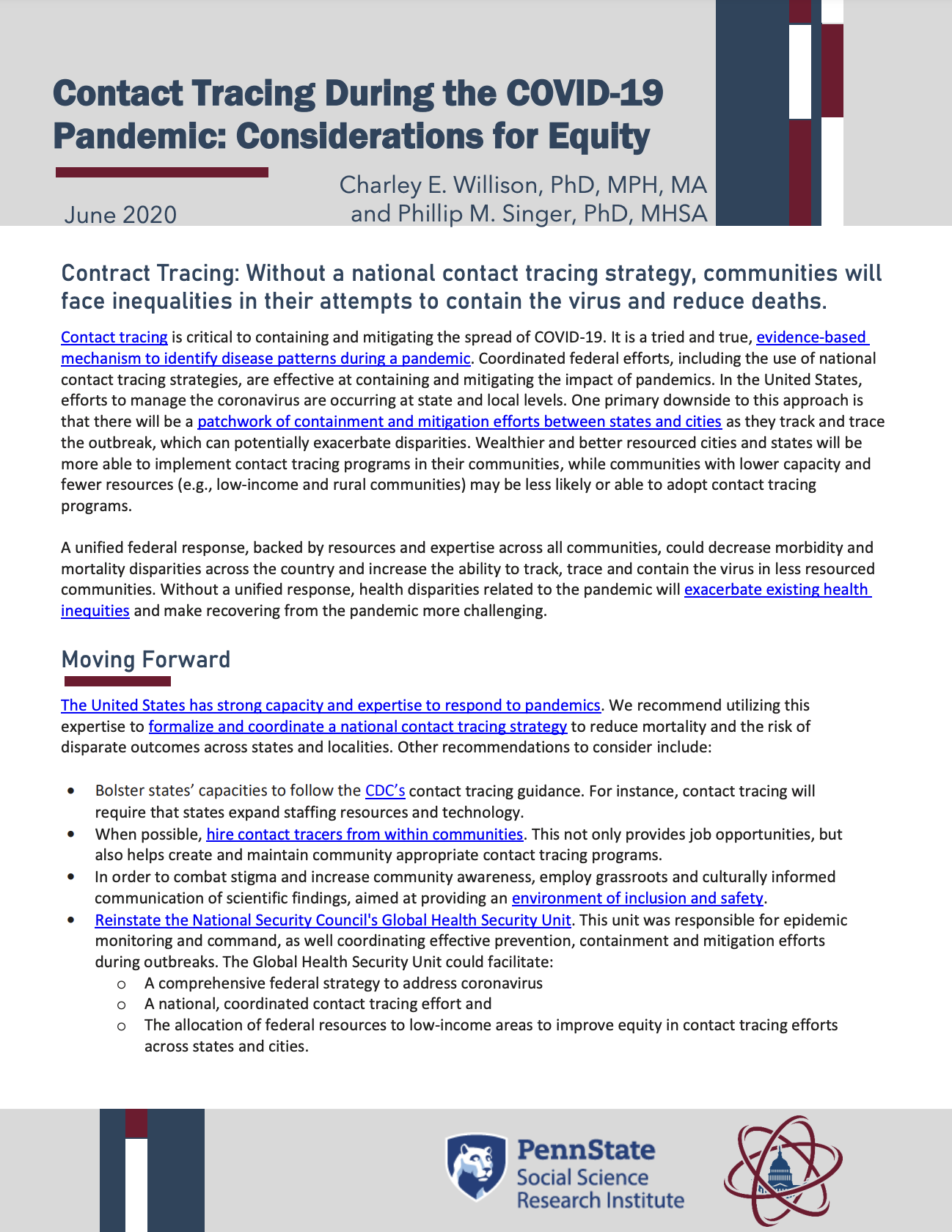
Contract Tracing: Without a national contact tracing strategy, communities will face inequalities in their attempts to contain the virus and reduce deaths.
Contact tracing is critical to containing and mitigating the spread of COVID-19. It is a tried and true, evidence-based mechanism to identify disease patterns during a pandemic. Coordinated federal efforts, including the use of national contact tracing strategies, are effective at containing and mitigating the impact of pandemics. In the United States, efforts to manage the coronavirus are occurring at state and local levels. One primary downside to this approach is that there will be a patchwork of containment and mitigation efforts between states and cities as they track and trace the outbreak, which can potentially exacerbate disparities. Wealthier and better resourced cities and states will be more able to implement contact tracing programs in their communities, while communities with lower capacity and fewer resources (e.g., low-income and rural communities) may be less likely or able to adopt contact tracing programs.
A unified federal response, backed by resources and expertise across all communities, could decrease morbidity and mortality disparities across the country and increase the ability to track, trace and contain the virus in less resourced communities. Without a unified response, health disparities related to the pandemic will exacerbate existing health inequities and make recovering from the pandemic more challenging.
Moving Forward
The United States has strong capacity and expertise to respond to pandemics. We recommend utilizing this expertise to formalize and coordinate a national contact tracing strategy to reduce mortality and the risk of disparate outcomes across states and localities. Other recommendations to consider include:
- Bolster states’ capacities to follow the CDC’s contact tracing guidance. For instance, contact tracing will require that states expand staffing resources and technology.
- When possible, hire contact tracers from within communities. This not only provides job opportunities, but also helps create and maintain community appropriate contact tracing programs.
- In order to combat stigma and increase community awareness, employ grassroots and culturally informed communication of scientific findings, aimed at providing an environment of inclusion and safety.
- Reinstate the National Security Council’s Global Health Security Unit. This unit was responsible for epidemic monitoring and command, as well coordinating effective prevention, containment and mitigation efforts during outbreaks. The Global Health Security Unit could facilitate:
- A comprehensive federal strategy to address coronavirus
- A national, coordinated contact tracing effort and
- The allocation of federal resources to low-income areas to improve equity in contact tracing efforts across states and cities.
The Research-to-Policy Collaboration (RPC) works to bring together research professionals and public officials to support evidence-based policy. Please visit their website to learn more.
Key Information
RPC Website
Research-to-Policy Collaboration
More RPC Resources
RPC Resources
Publication DateJune 1, 2020
Resource TypeWritten Briefs
Share This Page
Contract Tracing: Without a national contact tracing strategy, communities will face inequalities in their attempts to contain the virus and reduce deaths.
Contact tracing is critical to containing and mitigating the spread of COVID-19. It is a tried and true, evidence-based mechanism to identify disease patterns during a pandemic. Coordinated federal efforts, including the use of national contact tracing strategies, are effective at containing and mitigating the impact of pandemics. In the United States, efforts to manage the coronavirus are occurring at state and local levels. One primary downside to this approach is that there will be a patchwork of containment and mitigation efforts between states and cities as they track and trace the outbreak, which can potentially exacerbate disparities. Wealthier and better resourced cities and states will be more able to implement contact tracing programs in their communities, while communities with lower capacity and fewer resources (e.g., low-income and rural communities) may be less likely or able to adopt contact tracing programs.
A unified federal response, backed by resources and expertise across all communities, could decrease morbidity and mortality disparities across the country and increase the ability to track, trace and contain the virus in less resourced communities. Without a unified response, health disparities related to the pandemic will exacerbate existing health inequities and make recovering from the pandemic more challenging.
Moving Forward
The United States has strong capacity and expertise to respond to pandemics. We recommend utilizing this expertise to formalize and coordinate a national contact tracing strategy to reduce mortality and the risk of disparate outcomes across states and localities. Other recommendations to consider include:
- Bolster states’ capacities to follow the CDC’s contact tracing guidance. For instance, contact tracing will require that states expand staffing resources and technology.
- When possible, hire contact tracers from within communities. This not only provides job opportunities, but also helps create and maintain community appropriate contact tracing programs.
- In order to combat stigma and increase community awareness, employ grassroots and culturally informed communication of scientific findings, aimed at providing an environment of inclusion and safety.
- Reinstate the National Security Council’s Global Health Security Unit. This unit was responsible for epidemic monitoring and command, as well coordinating effective prevention, containment and mitigation efforts during outbreaks. The Global Health Security Unit could facilitate:
- A comprehensive federal strategy to address coronavirus
- A national, coordinated contact tracing effort and
- The allocation of federal resources to low-income areas to improve equity in contact tracing efforts across states and cities.
The Research-to-Policy Collaboration (RPC) works to bring together research professionals and public officials to support evidence-based policy. Please visit their website to learn more.

Key Information
RPC Website
Research-to-Policy Collaboration
More RPC Resources
RPC Resources
Publication DateJune 1, 2020
Resource TypeWritten Briefs
Share This Page
LET’S STAY IN TOUCH
Join the Evidence-to-Impact Mailing List
Keep up to date with the latest resources, events, and news from the EIC.




